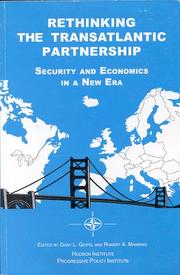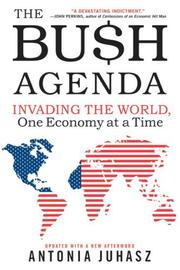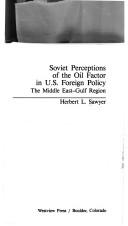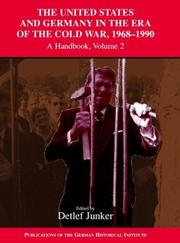| Listing 1 - 10 of 11 | << page >> |
Sort by
|

ISBN: 1558130608 Year: 1996 Publisher: Indianapolis : Hudson Institute,
Abstract | Keywords | Export | Availability | Bookmark
 Loading...
Loading...Choose an application
- Reference Manager
- EndNote
- RefWorks (Direct export to RefWorks)
Book
Abstract | Keywords | Export | Availability | Bookmark
 Loading...
Loading...Choose an application
- Reference Manager
- EndNote
- RefWorks (Direct export to RefWorks)
Book
Abstract | Keywords | Export | Availability | Bookmark
 Loading...
Loading...Choose an application
- Reference Manager
- EndNote
- RefWorks (Direct export to RefWorks)

ISBN: 9780060878788 Year: 2007 Publisher: New York : HarperCollins,
Abstract | Keywords | Export | Availability | Bookmark
 Loading...
Loading...Choose an application
- Reference Manager
- EndNote
- RefWorks (Direct export to RefWorks)
Book
ISBN: 9782213655574 Year: 2010 Publisher: Paris : Fayard,
Abstract | Keywords | Export | Availability | Bookmark
 Loading...
Loading...Choose an application
- Reference Manager
- EndNote
- RefWorks (Direct export to RefWorks)
Book
ISBN: 1898253129 Year: 1997 Publisher: London : Middlesex University Press,
Abstract | Keywords | Export | Availability | Bookmark
 Loading...
Loading...Choose an application
- Reference Manager
- EndNote
- RefWorks (Direct export to RefWorks)
Book
ISBN: 9780674979796 Year: 2017 Publisher: Cambridge, Massachusetts : The Belknap Press of Harvard University Press,
Abstract | Keywords | Export | Availability | Bookmark
 Loading...
Loading...Choose an application
- Reference Manager
- EndNote
- RefWorks (Direct export to RefWorks)
Today, nations increasingly carry out geopolitical combat through economic means. Policies governing everything from trade and investment to energy and exchange rates are wielded as tools to win diplomatic allies, punish adversaries, and coerce those in between. Not so in the United States, however. America still too often reaches for the gun over the purse to advance its interests abroad. The result is a playing field sharply tilting against the United States. In a cogent analysis of why the United States is losing ground as a world power and what it can do to reverse the trend, War by Other Means describes the statecraft of geoeconomics: the use of economic instruments to achieve geopolitical goals. Geoeconomics has long been a lever of America's foreign policy. But factors ranging from U.S. bureaucratic politics to theories separating economics from foreign policy leave America ill prepared for this new era of geoeconomic contest, while rising powers, especially China, are adapting rapidly. The rules-based system Americans set in place after World War II benefited the United States for decades, but now, as the system frays and global competitors take advantage, America is uniquely self-constrained. Its geoeconomic policies are hampered by neglect and resistance, leaving the United States overly reliant on traditional military force. Drawing on immense scholarship and government experience, Robert Blackwill and Jennifer Harris show that if America's policies are left uncorrected, the price in American blood and treasure will only grow. What geoeconomic warfare requires is a new vision of U.S. statecraft.
Book
ISBN: 9780670026449 Year: 2013 Publisher: New York : Viking,
Abstract | Keywords | Export | Availability | Bookmark
 Loading...
Loading...Choose an application
- Reference Manager
- EndNote
- RefWorks (Direct export to RefWorks)

ISBN: 0865319820 Year: 1983 Publisher: Boulder, CO : Westview,
Abstract | Keywords | Export | Availability | Bookmark
 Loading...
Loading...Choose an application
- Reference Manager
- EndNote
- RefWorks (Direct export to RefWorks)
USA--FOREIGN RELATIONS--USSR --- USSR--FOREIGN RELATIONS--USA --- PETROLEUM INDUSTRY AND TRADE--GOVERNMENT POLICY--USA --- USA--FOREIGN ECONOMIC RELATIONS--MIDDLE EAST --- MIDDLE EAST--FOREIGN ECONOMIC RELATIONS--USA --- USA--FOREIGN ECONOMIC RELATIONS--PERSIAN GULF REGION --- PERSIAN GULF REGION--FOREIGN ECONOMIC RELATIONS--USA

ISBN: 0521837316 052179112X 0521834201 0521168651 1316086089 0511195370 1139052446 0511196032 0511314388 1280477954 0511193971 0511194714 0521168643 131608552X 0511195036 1139052438 0511195699 0511314086 1280477644 0511193602 051119434X 9780511196034 9780521834209 9780511195372 9780511195693 9780511195037 9781139052436 Year: 2004 Volume: *8 Publisher: Washington Cambridge New York Port Melbourne German Historical Institute Cambridge University Press
Abstract | Keywords | Export | Availability | Bookmark
 Loading...
Loading...Choose an application
- Reference Manager
- EndNote
- RefWorks (Direct export to RefWorks)
These volumes were originally published in 2004. The close association between the United States and the Federal Republic of Germany was a key element in the international order of the Cold War era. No country had as wide-reaching or as profound an impact on the western portion of divided Germany as the United States. No country better exemplified the East-West conflict in American thinking than Germany. The United States and Germany in the Era of the Cold War examines all facets of German-American relations and interaction in the decades from the defeat of the Third Reich to Germany's reunification in 1990. In addition to its comprehensive treatment of US-West German political, economic, social, and cultural ties, The United States and Germany in the Era of the Cold War provides an overview of the more limited dealings between the US and the communist German Democratic Republic.
USA--FOREIGN RELATIONS--GERMANY (WEST) --- GERMANY (WEST)--FOREIGN RELATIONS--USA --- USA--FOREIGN ECONOMIC RELATIONS--GERMANY (WEST) --- GERMANY (WEST)--FOREIGN ECONOMIC RELATIONS--USA --- Germany --- United States --- Relations --- Foreign relations --- 1945-1989 --- Arts and Humanities --- History --- International relations.
| Listing 1 - 10 of 11 | << page >> |
Sort by
|

 Search
Search Feedback
Feedback About UniCat
About UniCat  Help
Help News
News